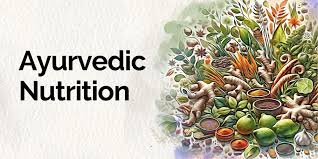Introduction
Ayurvedic Nutrition for Your Dosha emphasizes the importance of individual constitution (dosha) in determining dietary choices. Each person has a unique combination of the three doshas: Vata, Pitta, and Kapha. Understanding your dosha can help guide you in choosing foods that promote balance and optimal health. In this guide, we’ll explore Ayurvedic nutrition for your dosha and provide dietary tips to enhance your well-being.

Understanding the Doshas in Ayurvedic Nutrition
- Vata: Characterized by qualities like dryness, lightness, and coolness. Individuals with a predominance of Vata often have a thin build, are creative, and may experience anxiety or irregular digestion when out of balance.
- Pitta: Representing fire and heat, Pitta types are often ambitious, driven, and can become irritable or experience digestive issues when imbalanced. They usually have a medium build and strong metabolism.
- Kapha: Known for stability, Kapha types are often solidly built, calm, and nurturing. However, they may struggle with sluggishness and weight gain if their dosha is not balanced.
Dietary Guidelines for Each Dosha in Ayurvedic Nutrition
- Vata Dosha:
Focus on warm, moist, and oily foods. Include soups, stews, healthy fats (like ghee and olive oil), cooked grains (like rice and oats), and sweet fruits (like bananas and dates). Avoid cold foods, raw vegetables, and overly spicy dishes. - Pitta Dosha:
Focus on cool, calming, and slightly dry foods. Include leafy greens, cucumbers, sweet fruits (like melons and berries), and dairy products (like yogurt and milk). Avoid hot spices, fried foods, and overly acidic foods. - Kapha Dosha:
Focus on light, warm, and stimulating foods. Include whole grains, beans, bitter greens (like kale and arugula), and spicy foods (like ginger and black pepper). Avoid heavy, oily, and overly sweet foods.
The Role of Agni in Ayurvedic Nutrition
In Ayurveda, Agni (digestive fire) is crucial for digestion and absorption. To maintain strong Agni, eat fresh, organic foods, avoid processed foods, and incorporate spices like cumin, coriander, and fennel.
Additional Tips for Ayurvedic Nutrition
- Mindful Eating: Pay attention to your body’s signals and eat slowly.
- Seasonal Eating: Align your diet with the seasons, opting for warming foods in winter and cooling options in summer.
- Hydration: Stay hydrated with herbal teas and warm water.
Supplements and Herbal Support for Your Dosha
Incorporating Ayurvedic supplements can enhance your dietary choices:
- Triphala: Supports digestion and detoxification.
- Ginger: Aids digestion and can help alleviate nausea.
- Turmeric: Offers anti-inflammatory benefits.
Conclusion:
Eating according to your dosha is vital for promoting balance and well-being. By understanding your constitution and making mindful dietary choices, you can enhance your health.
“For personalized guidance on Ayurvedic nutrition based on your dosha, visit our [Contact Page].”
For more insights into how Ayurvedic principles can enhance your nutrition, check out this resource on The Ayurvedic Institute.


